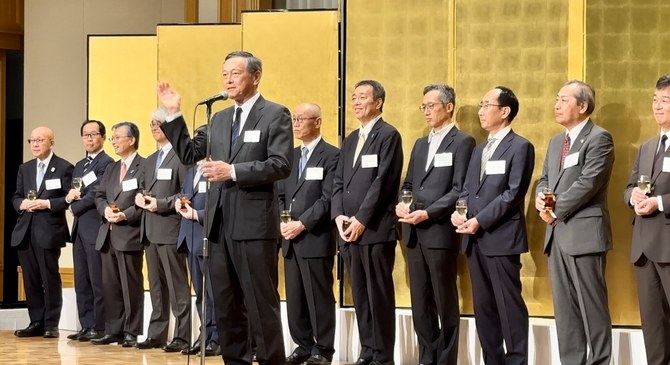In its quest to promote Japanese relations in the Middle East, the Middle East Institute of Japan (MEIJ) opened its doors to guests from the Japanese diplomatic community, mostly Japanese ambassadors within the Middle East region. The meeting, which was held in the city of Tokyo, also attracted over 150 guests drawn from the media, politics, and academia.
At the opening of the meeting, the president of the Institute, Akitaka Saiki, welcomed everyone and set the stage for the agenda of the meeting.
The chairman of the institute, Mikio Sasaki, expressed the reason behind the institute’s decision to organize such an important meeting. He said that the meeting is happening at a time when insecurity has become one of the key issues in the region, especially now that the U.S. influence around the world is gradually waning.
He buttressed his point by reeling out the foreign policy decisions of a few countries in recent times. He spoke about the United Arab Emirate and the recent rapprochement with Israel. He referred to Syria’s dramatic return to the Arab League and also Qatar’s new-found diplomatic relations with its immediate neighbors. He identified China’s rising profile within the region, citing its peace mediation between Saudi Arabia and Iran and its presence in ensuring harmony in the region.
During the speech, he spoke about the war in Ukraine. He said, “The impact of the Russian invasion of Ukraine on the energy and food sectors in the region and the quest of some Middle Eastern countries for regional stability and protecting their interests by strengthening relations with Russia.”
In an attempt to espouse the reason for the meeting, Mr. Sasaki said that Japan has been a great ally with most countries in the Middle East despite the unpredictability and complexity in global politics. He commended the efforts of Japan’s Ministry of Foreign Affairs and its ambassadors. He said that the upcoming visit of Fumio Kishida, the Prime Minister of Japan to UAE, Qatar and Saudi Arabia from July 16 explains a renewed desire to foster unity and progress.
The visit will be Kishida’s second visit to the Middle East since becoming a prime minister. As the country’s foreign minister, Kishida embarked on a shuttle diplomacy building relations with other countries.
According to Mr. Sasaki, the eyes of the world were on Japan, and they expected it to take charge and lead the region. However, he believed that the Middle East Institute was actively engaging and pioneering the cause, as expected from Japan.
Speaking on behalf of the 21 Japanese ambassadors present, Masayuki Miyamoto, the Japanese ambassador to Bahrain, spoke about his designation. He highlighted Japan-Bahrain relations and how they date back to over 50 years of diplomatic relations. He explained that Japan’s support for Bahrain goes back nearly 100 years, especially in the exportation of oil through Asano Corporation.
Miyamoto further stated that Japan’s relations with the Middle East go beyond conventional government-to-government diplomatic relations. To him, it also includes relations with Arab Royal families and Japanese imperial families, which, according to him, were “ties of equal importance”.
He talked about “the establishment of diplomatic relations between Israel and (some) Gulf States and the resumption of diplomatic relations between Iran and Saudi Arabia.” He considered them as developments gradually shaping relations in the region.
In his final statements, Miyamoto decried the working and living conditions of Japan’s embassy staff in the Middle East. He also raised an alarm over the difficult working conditions of employees of Japanese companies.
The Middle East Institute of Japan, the organizers of the meeting, is a non-partisan policy analysis, educational, and knowledge organization. It was founded in February 1956 as an organization populated by intellectuals with backgrounds in Middle Eastern Affairs. It was founded to provide informed knowledge, research, policies, and insight into Middle East Affairs from the prism of Japan and the world.









